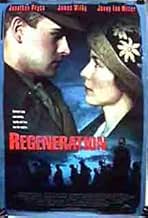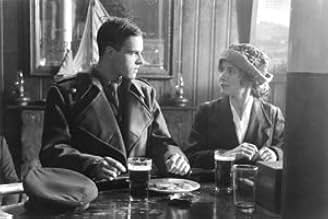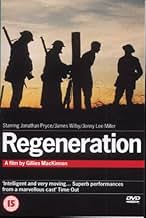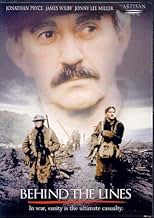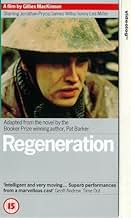IMDb RATING
7.0/10
2.6K
YOUR RATING
Based on Pat Barker's novel of the same name, "Regeneration" tells the story of soldiers of World War One sent to an asylum for emotional troubles. Two of those soldiers are England's most i... Read allBased on Pat Barker's novel of the same name, "Regeneration" tells the story of soldiers of World War One sent to an asylum for emotional troubles. Two of those soldiers are England's most important WW1 poets.Based on Pat Barker's novel of the same name, "Regeneration" tells the story of soldiers of World War One sent to an asylum for emotional troubles. Two of those soldiers are England's most important WW1 poets.
- Nominated for 1 BAFTA Award
- 17 nominations total
- Director
- Writers
- All cast & crew
- Production, box office & more at IMDbPro
Featured reviews
Beginning with a fluid bird-eye-view shot tracking across the corpse-strewn muddy trenches of First World War Northern France, we are introduced to the character of the real-life war-poet Siegfried Sassoon (James Wilby), as he is shipped home and placed in Craiglockhart, a castle in Scotland being used as a military-run psychiatric hospital for soldiers suffering from war-neuroses. Sassoon's particular neurosis is little more than a conscious objection to the direction in which the war has turned in it's latter stages (1917), bringing him into conflict with the British military establishment (who had previously awarded him a Military Cross for bravery), and in particular psychiatrist Dr William Rivers (the ever reliable Jonathan Pryce), who is charged with the task of treating the various traumatised soldiers under his domain.
Taking a rather different approach from the 'war-is-hell' mass-entertainment spectacle of Spielberg's recent 'Saving Private Ryan' and Terence Malick's elliptical 'The Thin Red Line' (both made in 1998), 'Regeneration' evades easy solutions and focuses on the psychological horrors of war in a more low-key and balanced manner. The horrific battle scenes are largely eluded to in flashback, invoked during the well-meaning Pryce's therapy sessions, which utilise the entire arsenal of early Freudian psychotherapy, from dream-analysis to hypnotism as well as more quirky techniques such as putting shell-shocked officers in charge of troops of boy scouts in order to help them regain confidence in their leadership abilities. The central perplexity here is that the soldiers are being cured with the intention of sending them straight back to the front line.
With this and his following film, 'Hideous Kinky', Gillies MacKinnon is emerging as one of the most thought-provoking and technically accomplished British directors working at the moment, adopting an expressionistic cinematic style here which utilises the dark forbidding milieu of the hospital and the surrounding bleak, autumnal countryside to full claustrophobic effect. There are problems here, in the way that the script concentrates on a number of patients, including an angst-ridden Jonny Lee Miller (in his first post-Trainspotting role) who begins the film mute, without fully exploring the relationships between them, but it successfully establishes itself within a convincing historical context whilst challenging the proposition that Britain was united in its conviction to the First World War (of particular relevance today, given our involvement in the bombings of Kosovo and Iraq). Whilst not immediately accessible, it is a film that demands and rewards the closest of attention, and bodes well for future films from the director. Based on the 'Regeneration' trilogy of novels by Pat Barker.
Taking a rather different approach from the 'war-is-hell' mass-entertainment spectacle of Spielberg's recent 'Saving Private Ryan' and Terence Malick's elliptical 'The Thin Red Line' (both made in 1998), 'Regeneration' evades easy solutions and focuses on the psychological horrors of war in a more low-key and balanced manner. The horrific battle scenes are largely eluded to in flashback, invoked during the well-meaning Pryce's therapy sessions, which utilise the entire arsenal of early Freudian psychotherapy, from dream-analysis to hypnotism as well as more quirky techniques such as putting shell-shocked officers in charge of troops of boy scouts in order to help them regain confidence in their leadership abilities. The central perplexity here is that the soldiers are being cured with the intention of sending them straight back to the front line.
With this and his following film, 'Hideous Kinky', Gillies MacKinnon is emerging as one of the most thought-provoking and technically accomplished British directors working at the moment, adopting an expressionistic cinematic style here which utilises the dark forbidding milieu of the hospital and the surrounding bleak, autumnal countryside to full claustrophobic effect. There are problems here, in the way that the script concentrates on a number of patients, including an angst-ridden Jonny Lee Miller (in his first post-Trainspotting role) who begins the film mute, without fully exploring the relationships between them, but it successfully establishes itself within a convincing historical context whilst challenging the proposition that Britain was united in its conviction to the First World War (of particular relevance today, given our involvement in the bombings of Kosovo and Iraq). Whilst not immediately accessible, it is a film that demands and rewards the closest of attention, and bodes well for future films from the director. Based on the 'Regeneration' trilogy of novels by Pat Barker.
10LukeS
Regeneration treats its audience with respect. The dramatic denouement and characters are not simply laid bare for a popcorn-audience to mindlessly digest. The film unfolds, the scenarios develop, the characters live and breath the ugly reality of warfare. And this all happens in a natural, credible manner beautifully shot and paced by the under-rated Gillies McKinnon.
The opening aerial shot of the bloody consequences of battle are every bit the emotional and visceral equal of Spielberg's lauded 20-minute opening sequence in Saving Private Ryan. The rest of the film - in my opinion - surpasses Ryan as a whole in terms of its drama, poetry, anguish and thought.
The performances are outstanding. Jonathan Pryce's portrayal of Rivers falling apart at the seams as he adopts the neuroses and trauma of his patients is astonishing. Johnny Lee Miller is also excellent as the (initially) mute soldier, haunted by the brutality of a trench-attack. James Wilby's Siegfried Sassoon is perhaps the toughest role to play in the film and yet he surpasses any prior (or subsequent) performances with a characterisation that swings from harsh to likeable, strong to weak, right to wrong.
All of the numerous storylines are well constructed and followed to their natural conclusion. There are no false avenues; no bum notes; no waste.
The source material is beautifully adapted for the film (by the rare breed of writer-producer, Allan Scott), losing none of its pace or characterisation. The emotional weight so prominent in Barker's novel are perfectly transferred into the movie. How wonderful for a modern film to have non-stereotypical, imperfect lead characters and lack easy conclusions. How beautifully evoked is the friendship between Sassoon and Owen. There is no sacharine sentiment in this movie; nor artificial shock to induce pity; nor a wasted scene or moment of dialogue. Equally, the period look of the film is stunning. Filmed in Scotland, the vistas are beautifully bleak and wintry. The atmosphere of the First World War is all too frighteningly real.
The music, whilst beautiful, is perfectly restrained. Harking back to the films of the seventies, long moments of silence pervade Regeneration. How did things go so badly wrong in the last twenty years in this respect?
Regeneration achieves the very rare distinction of matching (if not surpassing) the beautiful and moving novel on which it is based. Thoughtful film-goers should treat themselves to this wonderful and intelligent film.
The opening aerial shot of the bloody consequences of battle are every bit the emotional and visceral equal of Spielberg's lauded 20-minute opening sequence in Saving Private Ryan. The rest of the film - in my opinion - surpasses Ryan as a whole in terms of its drama, poetry, anguish and thought.
The performances are outstanding. Jonathan Pryce's portrayal of Rivers falling apart at the seams as he adopts the neuroses and trauma of his patients is astonishing. Johnny Lee Miller is also excellent as the (initially) mute soldier, haunted by the brutality of a trench-attack. James Wilby's Siegfried Sassoon is perhaps the toughest role to play in the film and yet he surpasses any prior (or subsequent) performances with a characterisation that swings from harsh to likeable, strong to weak, right to wrong.
All of the numerous storylines are well constructed and followed to their natural conclusion. There are no false avenues; no bum notes; no waste.
The source material is beautifully adapted for the film (by the rare breed of writer-producer, Allan Scott), losing none of its pace or characterisation. The emotional weight so prominent in Barker's novel are perfectly transferred into the movie. How wonderful for a modern film to have non-stereotypical, imperfect lead characters and lack easy conclusions. How beautifully evoked is the friendship between Sassoon and Owen. There is no sacharine sentiment in this movie; nor artificial shock to induce pity; nor a wasted scene or moment of dialogue. Equally, the period look of the film is stunning. Filmed in Scotland, the vistas are beautifully bleak and wintry. The atmosphere of the First World War is all too frighteningly real.
The music, whilst beautiful, is perfectly restrained. Harking back to the films of the seventies, long moments of silence pervade Regeneration. How did things go so badly wrong in the last twenty years in this respect?
Regeneration achieves the very rare distinction of matching (if not surpassing) the beautiful and moving novel on which it is based. Thoughtful film-goers should treat themselves to this wonderful and intelligent film.
Regeneration is an amazing film, it discusses the unseen wounds left on soldiers by war. The emotional trauma it causes them and how best we can help them, if we can at all.
James Wilby gives a remarkable performance as an officer who is sickened by the war that he sees around him. He isn't so much mentally ill as disgusted with war and his contribution in it. Jonny Lee Miller is also amazing in his portrayal of an officer driven mute. When he discovers his voice he is angry and argumentative, but slowly we discover that all of his anger is a shell to protect the hurt that has built up inside of him.
One of the biggest underlying themes in this film is how useless war is, even if it is for the right cause. Mainly because it destroys the human psyche and removes hope.
This is a startling film, and touching and emotional. It cuts to the core of who we all are, as human beings.
James Wilby gives a remarkable performance as an officer who is sickened by the war that he sees around him. He isn't so much mentally ill as disgusted with war and his contribution in it. Jonny Lee Miller is also amazing in his portrayal of an officer driven mute. When he discovers his voice he is angry and argumentative, but slowly we discover that all of his anger is a shell to protect the hurt that has built up inside of him.
One of the biggest underlying themes in this film is how useless war is, even if it is for the right cause. Mainly because it destroys the human psyche and removes hope.
This is a startling film, and touching and emotional. It cuts to the core of who we all are, as human beings.
There are very few films glorifying the first world war, called the "Great War" by those who fought and lived through it. If anything, Hollywood has avoided the subject and left it to a few European filmmakers, for very good reason. For sheer carnage, nothing has surpassed it. The slaughter of very young men was truly appalling. One can only imagine the reaction today if 50,000 men were dying each month to hold or advance over 100 yards of desolate mud. I went to school in England where the walls of our classroom were covered with the photos of pupils who had died in the war. Mostly aged 17. It was not until much later that I realised why there were so many unmarried middle aged women around in the 50's, when the writer Dr. Phyllis Bentley explained that there was no one for them to marry. An entire generation of men had been wiped out.
Regeneration is a thoughtful anti-war film where the paradox of war is implied in a Scottish hospital for the treatment of shell shocked officers. The doctor has to get them well so they can be returned to the front lines, where they will more than likely be killed. The script is intelligent and the acting is superb. There are some allegorical scenes which do more to underscore the pigheaded arrogant mentality of the "establishment" which continued a war until quite simply, there was no one left to fight. Even sick men with TB were sent off to fight. Perhaps the saddest aspect of watching this film is when you realize that WWII began 21 years after the first once ended, just long enough for the new generation of soldiers to grow up.
Regeneration is a thoughtful anti-war film where the paradox of war is implied in a Scottish hospital for the treatment of shell shocked officers. The doctor has to get them well so they can be returned to the front lines, where they will more than likely be killed. The script is intelligent and the acting is superb. There are some allegorical scenes which do more to underscore the pigheaded arrogant mentality of the "establishment" which continued a war until quite simply, there was no one left to fight. Even sick men with TB were sent off to fight. Perhaps the saddest aspect of watching this film is when you realize that WWII began 21 years after the first once ended, just long enough for the new generation of soldiers to grow up.
10Emily-98
For me, this film was, in a quiet, deeply felt way, much more powerful overall than "Saving Private Ryan," to which everyone seems to feel they must compare it (although regardless of one's opinion about their comparative merits, it is a false analogy in some ways because "Regeneration" is a WWI movie and addresses very different questions). While the first 20 minutes of "Saving Private Ryan" are stunning and their impact incredible, after that it becomes a rather disappointingly conventional war movie.
"Regeneration" is different. It is not with graphically real blood spilled, but rather with powerfully wrenching emotion and with poetry that this film drives home what war does to the men (and women) caught up in its sweep. The film's use of the poems of Siegfried Sassoon and Wilfred Owen is stunning, and while perhaps even more of their incredible poetry could have been employed in the film, the ones the filmmaker employs are carefully and perfectly chosen.
This is a war movie because its focus is on the war's destruction of men. But do not go into this film expecting the action of the battlefield to play out on the screen. There are a few scenes from the fields of France, powerful and well-placed in the film. And throughout the movie, you can just hear the dull thudding of shells, as if from a great distance - a striking reminder of how physical distance does not mean emotional distance. But if you are interested in the emotional impact those shells had, in an examination of the struggle to recover from that impact, (through poetry, through love, and through therapy), and in the moral questions raised by war, this is a stunning, deeply moving film you will not soon forget.
"Regeneration" is different. It is not with graphically real blood spilled, but rather with powerfully wrenching emotion and with poetry that this film drives home what war does to the men (and women) caught up in its sweep. The film's use of the poems of Siegfried Sassoon and Wilfred Owen is stunning, and while perhaps even more of their incredible poetry could have been employed in the film, the ones the filmmaker employs are carefully and perfectly chosen.
This is a war movie because its focus is on the war's destruction of men. But do not go into this film expecting the action of the battlefield to play out on the screen. There are a few scenes from the fields of France, powerful and well-placed in the film. And throughout the movie, you can just hear the dull thudding of shells, as if from a great distance - a striking reminder of how physical distance does not mean emotional distance. But if you are interested in the emotional impact those shells had, in an examination of the struggle to recover from that impact, (through poetry, through love, and through therapy), and in the moral questions raised by war, this is a stunning, deeply moving film you will not soon forget.
Did you know
- TriviaThe film used a lot of present and former Territorial Army soldiers as extras for larger scenes. This includes soldiers from 52nd Lowland, 6th Battalion Royal Regiment of Scotland, located in Hotspur street, Glasgow.
- GoofsThe camera and the crane on which it is suspended are reflected in several puddles during the very opening shot (of the battlefield).
- Quotes
Capt. William Rivers: I find it interesting that you don't stutter.
Billy Prior: I find it even more interesting that you do.
- Alternate versionsReleased in the USA in a 96 minute version under the title "Behind the Lines".
- ConnectionsFeatured in The 100 Greatest War Films (2005)
- SoundtracksJust Before The Battle, Mother
Words and Music by George Frederick Root (As G.F. Root)
Performed by Craig Titus
- How long is Regeneration?Powered by Alexa
Details
- Release date
- Countries of origin
- Language
- Also known as
- Krigets dårar
- Filming locations
- Overtoun House, Dumbarton, West Dunbartonshire, Scotland, UK(Craiglockhart Hospital)
- Production companies
- See more company credits at IMDbPro
Box office
- Gross US & Canada
- $33,131
- Opening weekend US & Canada
- $19,593
- Aug 16, 1998
- Gross worldwide
- $33,131
Contribute to this page
Suggest an edit or add missing content


